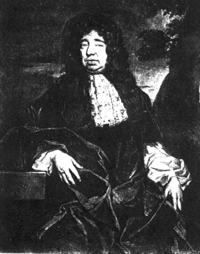William Petty
|
|
- This article is about the English scientist. For his great grandson the British Prime Minister and Irish peer, see William Petty, 2nd Earl of Shelburne.
Sir William Petty (May 27 1623-December 16 1687) was a scientist and philosopher. Born in Romsey the son of a Hampshire clothier, Petty held extensive holdings in Ireland due to association with Oliver Cromwell and Commonwealth. He was Member of Parliament briefly, being a scientist, inventor, and entrepreneur, and was a charter member of the Royal Society. Knighted in 1661. He was the great-grandfather of William Petty Fitzmaurice, 2nd Earl of Shelburne & 1st Marquess of Landsdowne.
He went to sea in 1636. and, finding himself in Normandy, supported himself by teaching English while studying at a Jesuit school in Caen. On the outbreak of the English Civil War, he became an exile in Paris and the assistant of Thomas Hobbes, and moved in the circles of Mersenne and Gassendi. Having studied medicine in the Netherlands, he went back to England in 1646 to complete his studies at Brasenose College, Oxford.
In 1651, he left Oxford to become the official physician to Oliver Cromwell's army in Ireland, where, apart from his medical duties, he became involved in devising a scheme to make the army self-financing by undertaking a comprehensive land survey. This successful enterprise made him a rich man, and, as a Cromwellian supporter, he stood for Parliament in 1659 for West Looe. Despite his political alliegances, he was well-treated at the Restoration, although he lost some of his Irish lands.
He was a founder member of the Royal Society, and counted among his many scientific interests naval architecture: he had become convinced of the superiority of double-hulled boats, although they were not always successful; the Experiment reached Oporto on 1664, but sank on the way back.
He is most well known for economic history and statistic writings, pre-Adam Smith. Of particular interest were Petty's forays into statistical analysis. Petty's work in political arithmetic, along with the work of John Graunt, laid the foundation for modern census techniques. Moreover, this work in statistical analysis, when further expanded by writers like Josiah Child, documented some of the first expositions of modern insurance.
Publications
- A Treatise of Taxes and Contributions (1662)
- Political Arithmetic posthum. (approx. 1676, pub. 1690)
- Verbum Sapienti posthum. (1664, pub. 1691)
- Political Anatomy of Ireland posthum. (1672, pub. 1691)
- Quantulumcunque Concerning Money posthum. (1682, pub. 1695)
External links
Some of Petty's works are available on the Archive for the History of Economic Thought website
- William Petty (http://socserv2.socsci.mcmaster.ca/~econ/ugcm/3ll3/petty/index.html)
The National Portrait Gallery has 5 portraits of Sir William Petty
- Search the collection (http://www.npg.org.uk/live/search/)de:William Petty

